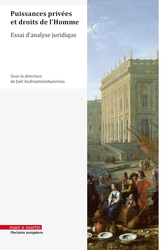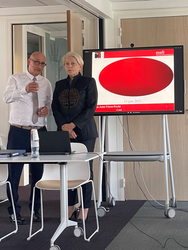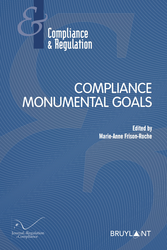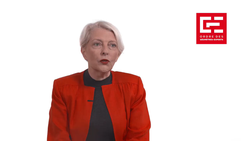Nov. 6, 2025
Conferences

🌐Subscribe to the Newsletter MAFR Regulation, Compliance, Law
🌐Subscribe to the video newsletter MAFR Overhang
🌐Subscribe to the Newsletter MaFR Law & Art
____
► Full reference : M.-A. Frison-Roche, "Concevoir une Raison d'être et l'explicitre (Conceiving a Raison d'être and explaining it)", speech at the round table discussion "Dire sa Raison d'être (Expressing your Raison d'être)", National Conference of the Géomètres Expert (French Chartered Surveyors), 6 November 2025, Paris.
____
► Presentation of the Round Table : This round table opens two days of work bringing together all the leaders, members of the Council of the Order of Chartered Surveyors and Regional Councils of Chartered Surveyors, in the presence of the relevant Ministry, in specific sessions during which the two Raison d'être that have been developed over several years of work and adopted, the Raison d'être of the profession and the Raison d'être of the Order, are presented.
🪑🪑🪑Other participants in the round table discussion, moderated by Hervé Grélard, General Deputy of the French Order of Chartered Surveyors:
🕴🏻Thomas Bonnel, chartered surveyor
🕴🏻Luc Lanoy, chartered surveyor,
🕴🏻Séverine Vernet, Chairwoman of the French Order of Chartered Surveyors
____
► Summary of my presentation : Firstly, I spoke to remind everyone what a "raison d'être" is, in itself, and why it is particularly important when the entity that embodies it also constitutes a "profession", the raison d'être expressing this hybrid nature that is destined to endure in today's societies. It moves those who uphold the raison d'être – the professional, the profession, the umbrella organisation that is the Order – from the past to the future. To effectively carry this raison d'être, its bearer cannot remain isolated. Unlike the agent who operates in a market and whose strategy is solitary dynamism against others, the bearer of the raison d'être must find allies who share similar or compatible ideas and develop points of contact to carry out a collective project (the "Monumental Goals"). This is why it is just as important to communicate, explain and share the raison d'être with the outside world.
Secondly, as the discussion surrounding the statement of purpose of the French Order of Surveyors and the profession progressed, I was led to point out that the raison d'être is not, or not only, ethical in nature, but also legal in nature, constituting at the very least a legal fact that can become enforceable against those who recognise themselves in it and claim it. This kind of reward, which is the "ex ante responsibility" expressed by the raison d'être and relayed by Compliance Law, anchored in its monumental goals of sustainability and responsibility, justifies that the profession that embraces its raison d'être is not simply an efficient profession in a supply and demand market, but establishes the Order as a regulator. This places both in the long term.
________
⛏️Further reading on the subject: (with English Summaries)
🕴🏻M.-A. Frison-Roche, 💬"Géomètres-experts : une profession qui assume concrètement sa responsabilité territoriale", 2025
🕴🏻M.-A. Frison-Roche, 📝A quoi engagent les engagements, 2025
🕴🏻M.-A. Frison-Roche et 🕴🏻S. Vernet, 📝La profession investit le Droit de la compliance et détermine sa Raison d'être, 2023
🕴🏻M.-A. Frison-Roche, 📧Quels sont les points de contact entre la Raison d'être des entreprises et le Droit de la Compliance ?, 2022
________

Updated: June 5, 2025 (Initial publication: June 20, 2024)
Publications

🌐follow Marie-Anne Frison-Roche on LinkedIn
🌐subscribe to the Newsletter MAFR Regulation, Compliance, Law
🌐subscribe to the Video Newsletter MAFR Surplomb
____
 ► Full Reference: M.-A. Frison-Roche, The will, the heart and the calculation, the three traits encercling the Compliance Obligation, March 2024.
► Full Reference: M.-A. Frison-Roche, The will, the heart and the calculation, the three traits encercling the Compliance Obligation, March 2024.
____
📝 This Working Paper is the basis for the contribution "The will, the heart and the calculation, the three traits encercling the Compliance Obligation", in📘Compliance Obligation.
____
► Summary of this Working Paper: There is often a dispute over the pertinent definition of Compliance Law, but the scale and force of the resulting obligation for the companies subject to it is clear. It remains difficult to define. First, we must not to be overwhelmed by the many obligations through which the Compliance Obligation takes shape, such as the obligation to map, to investigate, to be vigilant, to sanction, to educate, to collaborate, and so on. Not only this obligations list is very long, it is also open-ended, with companies themselves and judges adding to it as and when companies, sectors and cases require.
Nor should we be led astray by the distance that can be drawn between the contours of this Compliance Obligation, which can be as much a matter of will, a generous feeling for a close or distant other in space or time, or the result of a calculation. This plurality does not pose a problem if we do not concentrate all our efforts on distinguishing these secondary obligations from one another but on measuring what they are the implementation of, this Compliance Obligation which ensures that entities, companies, stakeholders and public authorities, contribute to achieving the Goals targeted by Compliance Law, Monumental Goals which give unity to the Compliance Obligation. Thus unified by the same spirit, the implementation of all these secondary obligations, which seem at once disparate, innumerable and often mechanical, find unity in their regime and the way in which Regulators and Judges must control, sanction and extend them, since the Compliance Obligation breathes a common spirit into them.
In the same way that the multiplicity of compliance techniques must not mask the uniqueness of the Compliance Obligation, the multiplicity of sources must not produce a similar screen. Indeed, the Legislator has often issued a prescription, an order with which companies must comply, Compliance then often being perceived as required obedience. But the company itself expresses a will that is autonomous from that of the Legislator, the vocabulary of self-regulation and/or ethics being used in this perspective, because it affirms that it devotes forces to taking into consideration the situation of others when it would not be compelled to do so, but that it does so nonetheless because it cares about them. However, the management of reputational risks and the value of bonds of trust, or a suspicious reading of managerial choices, lead us to say that all this is merely a calculation.
Thus, the contribution sets out to identify the Compliance Obligation by recognising the role of all these different sources. It emphasises that, in monitoring the proper performance of technical compliance obligations by Managers, Regulators and Judges, insofar as they implement the Compliance Obligation, it is pointless to limit oneself to a single source or to rank them abruptly in order of importance. The Compliance Obligation is part of the very definition of Compliance Law, built on the political ambition to achieve these Monumental Goals of preserving systems - banking, financial, energy, digital, etc. - in the future, so that human beings who cannot but depend on them are not crushed by them, or even benefit from them. This is the teleological yardstick by which the Compliance Obligation is measured, and with it all the secondary obligations that give it concrete form, whatever their source and whatever the reason why the initial standard was adopted.
In order to define Compliance's Obligation, the contribution endeavours to recognise the contribution of all these three sources: Will, Heart and Calculation.
_____
🔓read the developments below ⤵️
April 18, 2024
Publications

🌐follow Marie-Anne Frison-Roche on LinkedIn
🌐subscribe to the Newsletter MAFR Regulation, Compliance, Law
🌐subscribe to the Video Newsletter MAFR Surplomb
____
► Full reference: M.-A. Frison-Roche, "L’usage des puissances privées par le droit de la compliance pour servir les droits de l’homme" (Use of private companies by Compliance Law to serve Human Rights) , in J. Andriantsimbazovina (dir.), Puissances privées et droits de l'Homme. Essai d'analyse juridique, Mare Martin, coll. "Horizons européens", 2024, pp. 279-295
____
🚧read the Bilingual Working Paper on which this article is based, with more technical developments, references and hypertext links
____
► English Summary of this article: Following the legal tradition, Law creates a link between power with a legitimate source, the State, public power being its prerogative, while private companies exercise their power only in the shadow of this public power exercised ex ante. The triviality of Economic Law, of which Competition Law is at the heart, consisting of the activity of companies that use their power on markets, relegates the action of the State to the rank of an exception, admissible if the State, which claims to exercise this contrary power, justifies it. The distribution of roles is thus reversed, in that the places are exchanged, but the model of opposition is shared. This model of opposition exhausts the forces of the organisations, which are relegated to being the exception. However, if we want to achieve great ambitions, for example to give concrete reality to human rights beyond the legal system within which the public authorities exercise their normative powers, we must rely on a new branch of Law, remarkable for its pragmatism and the scope of the ambitions, including humanist ambitions, that it embodies: Compliance Law.
Compliance Law is thus the branch of Law which makes the concern for others, concretised by human rights, borne by the entities in a position to satisfy it, that is to say the systemic entities, of which the large companies are the direct subjects of law (I). The result is a new division between Public Authorities, legitimate to formulate the Monumental Goal of protecting human beings, and private organisations, which adjust to this according to the type of human rights and the means put in place to preserve them. Corporations are sought after because they are powerful, in that they are in a position to make human rights a reality, in their indifference to territory, in the centralisation of Information, technologies and economic, human, and financial means. This alliance is essential to ensure that the system does not lead to a transfer of political choices from Public Authorities to private companies; this alliance leads to systemic efficiency. The result is a new definition of sovereignty as we see it taking shape in the digital space, which is not a particular sector since it is the world that has been digitalised, the climate issue justifying the same new distribution of roles (II).
____
📝read the article (in French)
________
July 28, 2023
Interviews

♾️follow Marie-Anne Frison-Roche on LinkedIn
♾️subscribe to the Newsletter MAFR Regulation, Compliance, Law
____
► Full Reference: M.-A. Frison-Roche & S. Vernet, "La profession investit le Droit de la compliance et détermine sa Raison d’être" ("The profession invests Compliance Law and determines its Raison d'être"), Actualités, Ordre des Géomètres-Experts, July 28, 2023
____
💬read the interview (in French)
____
► Presentation of the interview by the Ordre des Géomètres-Experts: "Pour mieux répondre aux défis d’une société en pleine mutation, ainsi qu’aux attentes de ses clients et concitoyens, la profession détermine sa Raison d’être. Séverine Vernet, première Vice-présidente de l’Ordre des géomètres-experts et Marie-Anne Frison-Roche, professeur de droit économique et spécialiste du droit de la régulation et de la compliance, nous expliquent cette démarche innovante." ("To better meet the challenges of a rapidly changing society and the expectations of its customers and fellow citizens, the profession is defining its raison d'être. Séverine Vernet, First Vice-President of the Ordre des géomètres-experts, and Marie-Anne Frison-Roche, Professor of Economic Law and specialist in Regulatory and Compliance Law, explain this innovative approach.").
____
► Questions asked (in French):
- Séverine Vernet, vous êtes la première Vice-présidente de l’OGE et présidente de la nouvelle commission compliance. Permettez-moi tout d’abord de vous féliciter pour votre réélection. Quels seront les prochains chantiers du mandat qui démarre ? Et votre ambition pour ce nouveau mandat ?
- Marie-Anne Frison-Roche (mafr), vous êtes professeur d’université, spécialiste de droit économique et plus particulièrement du droit de la régulation et de la compliance, vous accompagnez l’Ordre dans la mise en place de cette démarche. Séverine Vernet parle de compliance. Pourriez-vous nous en proposer une définition ?
- L’OGE a créé une commission compliance spécifique que vous présidez. Pouvez-vous nous en dire un peu plus ?
- Comment passe-t-on d’un organisme de régulation à un acteur de la compliance ? En quoi est-ce innovant pour un Ordre professionnel ?
- Comment allez-vous vous y prendre pour engager la profession ?
- Quelles seront les étapes pour passer de la régulation à la compliance ?
________
June 15, 2023
Conferences

► Référence complète : M.-A. Frison-Roche, "La Compliance au cœur de la mission de l’Ordre des Géomètres-Experts", intervention devant le Conseil Supérieur de l'Ordre des Géomètres-Experts, Paris, 15 juin 2023.
____
► Résumé de l'intervention :
PRÉALABLE. NE PAS S’ENFERMER DANS UNE CONCEPTION DÉFENSIVE DES MISSIONS DE L’ORDRE DES GÉOMÈTRES-EXPERTS
●
I.CONCEVOIR LES MISSIONS DES GÉOMÈTRES-EXPERTS COMME DES PROFESSIONNELS MUS PAR UNE RAISON D’ÊTRE RÉPONDANT AUX ENJEUX ÉCONOMIQUES ET SOCIAUX : LA COMPLIANCE COMME PILIER
●
II.LA CONVERGENCE DES MISSIONS DES GÉOMÈTRES-EXPERTS ET DE LEUR ORDRE AVEC L’EUROPE DE LA RÉGULATION ET DE LA COMPLIANCE
________

April 25, 2023
Publications

🌐follow Marie-Anne Frison-Roche on LinkedIn
🌐subscribe to the Newsletter MAFR Regulation, Compliance, Law
____
 ► Full Reference: M.-A. Frison-Roche, The role of the Judge in the deployment of Regulatory Law through Compliance Law, Working Paper, April 2023.
► Full Reference: M.-A. Frison-Roche, The role of the Judge in the deployment of Regulatory Law through Compliance Law, Working Paper, April 2023.
____
🎤 This working paper was drawn up to serve as the basis for the concluding summary session of the colloquium organised by the Conseil d'Etat (French Administrative Supreme Court) and the Cour de cassation (French Judicial Supreme Court), De la régulation à la compliance: quel rôle pour le juge? ("From Regulation to Compliance: what role for the Judge?") held on 2 June 2023 at the Conseil d'Etat.
____
📝 This working paper also served as the basis for the article that concludes the book De la régulation à la compliance : quel rôle pour le juge, published by the La Documentation Française, 2024.
____
► Working Paper Summary: It is remarkable to note the unity of conception and practice between professionals who tend to work in administrative jurisdictions and professionals who tend to work in judicial jurisdictions: they all note, in similar terms, an essential movement: what Regulatory Law is, how it has been transformed into Compliance Law, and how in one and even more so in the other the Judge is at the centre of it. Judges, as well as regulators and European officials, explain this and use different examples to illustrate the profound transformation this has brought about for the law and for the companies responsible for increasing the systemic effectiveness of the rules through the practice and dissemination of a culture of compliance. The role of the judge participating in this Ex Ante transformation is renewed, whether he is a public law judge or a private law judge, in a greater unity of the legal system.
____
🔓read the Working Paper below⤵️
March 15, 2023
Thesaurus : Doctrine

► Full Reference: A. Le Goff, "Monumental Goals Perceived by the Firm: Serene Business or Business under Pressure?", in M.-A. Frison-Roche (ed.), Compliance Monumental Goals, coll. "Compliance & Regulation", Journal of Regulation & Compliance (JoRC) and Bruylant, 2023, p. 83-90.
____
📘read a general presentation of the book, Compliance Monumental Goals, in which this article is published.
____
► Summary of the article:
________
Sept. 20, 2022
Interviews

► Référence complète : M.-A. Frison-Roche, "La raison d'être est avant tout une notion juridique", entretien in Notariat, La journée de la Raison d'Etre,
____
____
📚Lire le numéro complet dans lequel s'insère l'entretien.
____
🎥Regarder l'intervention en vidéo de Marie-Anne Frison-Roche à la journée du Conseil Supérieur du Notariat sur la Raison d'être.
____
Sept. 15, 2022
Conferences

 ► Full Reference: Frison-Roche, M.A., Régulation et Compliance, expression des missions d'un Ordre, in📅 Ordre des Géomètres-experts, Une profession face aux défis de la société, Le Havre, September 15, 2022.
► Full Reference: Frison-Roche, M.A., Régulation et Compliance, expression des missions d'un Ordre, in📅 Ordre des Géomètres-experts, Une profession face aux défis de la société, Le Havre, September 15, 2022.
____
📅 read the general of the manifestation de la manifestation (in French)
____
🎥watch the one-minute video summarizing the twenty-minutes intervention (in French)
____
🚧 read English Presentation of the Working Paper which has been the basis of this conference
► English Summary of this intervention: Professional orders should not present themselves as exceptions, however legitimate they may be, in relation to a principle, which would be the competitive system, but as the expression of a principle. This principle is expressed by two branches of Law whose importance is constantly growing in European Law, liberal branches which are based on the conception of economic life and the definition of company, turned towards the future: the Regulatory Law and Compliance Law, two branches of Law both related and distinct.
Indeed, and this is the topic of the first part, Competition Law conceives professional orders as exceptions since these "corporations" constitute structural agreements. French domestic legal system both consolidates the professional orders by backing them up to the State, which would sub-delegate its powers to them, but involves them in the questioning by the European Union of the States and their tools. Most often the temptation is then to recall with a kind of nostalgia the times when the professional orders were the principle but, except to ask for a restoration, the time would be no more.
A more dynamic approach is possible, in accordance with the more general evolution of Economic Law. Indeed, the Professional Order is the expression of a profession, a little-exploited concept in Economic Law, over which the Order exercises the function of "Second-level Regulator", the public authorities exercising the function of "First-level Regulator". The Banking and Financial Regulatory Law is built in this way and operates thank to that, at national, European, and global level. This is what should be linked.
The Professional Orders therefore have the primary function of spreading a "Culture of Compliance" among the professionals they supervise and beyond them (clients and stakeholders). This culture of Compliance is developed regarding the missions which are concretized by the professionals themselves.
Therefore, the second part of the Working Paper deals with the legal evolution of the notion of "Mission" which has become central in Economic and General Law, through the technique of the mission-based company. However, there are multiple points of contact between the raison d'être, the company with a mission and Compliance Law as soon as the latter is defined by the concrete and overly ambitious goals that it pursues. : the Monumental Goals.
Each structure, for example the French Ordre des Géomètres-Experts, is legitimate to set the Monumental Goal that it pursues and that it inculcates, in particular the conception of territory and the living environment, joining what unites all the Monumental Goals of Compliance: concern for others. The French Ordre des Géomètres-Experts, is adequate because it has a more flexible relationship, both tighter and broader, with the territory than the State itself.
By instilling this in professionals, the Professional Order develops in the practitioner an "ex ante responsibility", which is a pillar of Compliance Law, constituting both a charge and a power that the practitioner exercises, and of which the Professional Order must be the supervisor.
____
► to go further ⤵️
- Frison-Roche, M.-A., 📘Compliance Monumental Goals, 2021
- Frison-Roche, M.-A., 💻Appliquer la notion de "Raison d'être" à la profession du Notariat, 2021
________
Sept. 1, 2022
Thesaurus : Doctrine

► Full Reference: A. Le Goff, "La part des banques dans la concrétisation des buts monumentaux de la compliance" ("The banks' part in achieving the Compliance Monumental Goals"), in M.-A. Frison-Roche (ed.), Les Buts Monumentaux de la Compliance, coll. "Régulations & Compliance", Journal of Regulation & Compliance (JoRC) and Dalloz, 2022, p. 69-75.
____
📕read a general presentation of the book, Les Buts Monumentaux de la Compliance, in which this article is published
____
► Summary of the article (done by the Journal of Regulation & Compliance): As the head of a banking group, the question is whether compliance requirements and techniques put companies "under pressure" or whether these obligations represent an opportunity for them, the former not excluding the latter. The author shows that the entire banking sector is under pressure from regulations that express the aim of Monumental Goals, the complexity coming from the fact that these evolve over time, sometimes making it difficult to comply with them. Within this general framework, the author shows that a mutual bank such as Crédit Mutuel Arkéa has great opportunities, since these Monumental Goals resonate not only with its social responsibility, particularly in a context of crisis, but also with what is, for Arkéa, its "raison d'être". Regulation thus supports the Group's operations and it's identity.
________
March 23, 2022
Thesaurus : Doctrine
► Référence complète : A. Menais (dir.), Raison d'être, engagement et responsabilité, préf. B. Le Marie, postace O. Grégoire, EMS Éditions, 2022, 192 p.
____
► Présentation de l'ouvrage (faite par l'éditeur) : C’est une révolution calme, certes, mais une vraie révolution sociétale que la loi Pacte a engagée.
Au-delà du droit, c’est en effet un nouvel espace qui s’ouvre pour équilibrer les relations entre État, entreprises et individus ; un espace qui permet de construire au-delà du capitalisme à un moment où les effets de la pandémie mondiale ont créé, de facto, les conditions du changement.
Cet ouvrage collectif ne prétend pas résoudre l’apparent paradoxe entre attentes de changements profonds sur le long terme et envie d’immédiateté de résultats, mais bien de mettre en lumière les enjeux juridiques, humains et sociaux, en particulier la responsabilité de l’entreprise et de ses dirigeants, qu’emportent les nouvelles notions établies par la loi du 22 mai 2019.
Les témoignages des experts en ressources humaines, en théories des organisations, des investisseurs, des économistes et des dirigeants, contributeurs à cet ouvrage, permettent d’appréhender les défi s inédits dévoilés par la définition des raisons d’être et des missions pour l’entreprise. Ils livrent des regards différents et complémentaires sur la nouvelle finalité des entreprises et des institutions : leur raison d’être. Ce sont des pionniers engagés qui témoignent de leurs choix, du chemin qu’ils ont parcouru et parfois entamé bien avant que la loi n’existe, et des attentes nées de ce changement.
____
► Auteurs des contributions : Jean-Paul Agon, Jean-David Aurange, Ludovic Aventin, Jean-Paul Berthomé, Christophe Bonduelle, Franck Carnero, Sophie Chambon-Diallo, Yves Chapot, Hervé Coureil, Jean-Marc Daniel, Bruno Dondero, Emmanuelle Duez, Charlotte Duthoo, Geneviève Férone-Creuzet, Ashley Grice, Nicolas Guérin, Armand Hatchuel, Martin Hitzer, Augustin Jaclin, Emery Jacquillat, Sophie Javary, Eric Labaye, Kevin Levillain, Caroline de la Marnierre, Adeline Lescanne Gautier, Helle Liautaud, Didier Martin, Colin Mayer, Lynn Paine, Alissa Pelatan, Alexandre Perra, Fanny Picard, Floriane de Saint Pierre, Blanche Segrestin, Julie Serrier, Dominique Stucki, Thibault de Tersant, Mathias Vicherat et Frank Wismer
____
Sept. 16, 2021
Thesaurus : Doctrine

► Full Reference: Le Fur, A.-V., Ch., "Interest and “raison d’être” of the company: how do they fit with the Compliance Monumental Goals?, in Frison-Roche, M.-A. (ed.), Compliance Monumental Goals, series "Compliance & Regulation", Journal of Regulation & Compliance (JoRC) and Bruylant, to be published.
___
► Article Summary (done by the Author): Companies would have a soul. The legislator thinks so, since the French law called "loi Pacte" of 22 May 2019 obliges managers to act in the Corporate Interest and allows companies to formulate themselves a « raison d'être ». Compliance Law does the same, relying on companies to save the world from corruption, slavery, terrorism and global warming, thus achieving Monumental goals.
At first glance, the contours of Corporate Interest and « raison d’être » of the company are not far removed from the notion of Compliance Monumental Goals. This is not surprising, since the objective that presided over their introduction into the French Civil Code is the same as that underlying Compliance Law : to rethink the place of the company in the global Society, by affirming long-term values or concerns. This is a reason to use these corporate law concepts in the context of an X-ray of the concept of Monumental Goals.
However, a comparative approach is disappointing. The divergences between corporate notions and compliance lead to the conclusion that Company Law is not intended to impose anything other than a corporate public order. These notions being more philosophical than legal, Corporate Interest and « raison d'être » are assigned functions that limit their scope. Consequence of the previous description, the imperative nature of corporate rules cannot be compared with the nature of compliance: uncertain, they are also relative compared with the "violence" of compliance rules. The impact of the notions of Interest and « raison d'être » remains thus mainly internal to the company.
According to a second approach, it cannot be ruled out that Corporate Interest and « raison d'être » allow for a better understanding of higher and universal values by Company Law. Corporate Interest may incorporate Compliance Monumental Goals while the « raison d'être » may constitute a perspective for the realization of these goals.
The stakes are high : when the interest of the company, as a legal person and autonomous economic agent, joins the Monumental Goals, the means of achieving the latter are multiplied by internalizing them in all companies, not just the largest ones. However, despite all good intentions, a company is only governable if the compass does not become an elusive and indecisive vane; in other words, if legal certainty is respected. This is why a legal ordering of the concepts is necessary, which ultimately leads to a suggestion of their domain, content and scope.
____
📝 go to the general presentation of the book, 📘 Compliance Monumental Goals, in which this article is published.
________
March 16, 2021
Compliance: at the moment

March 5, 2021
Hearings by a Committee or Public organisation

🌐suivre Marie-Anne Frison-Roche sur LinkedIn
🌐s'abonner à la Newsletter MAFR Regulation, Compliance, Law
____
► Référence complète : M.-A. Frison-Roche, "Appliquer la notion de "Raison d'être" à la profession du Notariat", audition par le Conseil supérieur du notariat (CSN), 5 mars 2021.
____
🔴trois ans plus tard, cette démonstration fût reprise et approfondie dans une audition devant le Conseil Supérieur du Notariat à propos de la Compliance, sur laquelle un rapport était élaboré, les notions de raison d'être et de compliance étant intimement corrélées comme cela est montré ci-dessous : consulter la présentation de l'audition de 2024..
____
Résumé de l'intervention débutant l'audition : L'on peut prendre "raison d'être" dans son sens courant et dans son sens plus juridique. Dans son sens courant, il est bien difficile de déterminer ce qu'est une "raison d'être". Le plus souvent on ne le traduit pas, en anglais on dira purpose , c'est-à-dire ce qui caractérise l'être humain par rapport à la machine, comme le souligna Alain Supiot, tandis que la langue japonaise le traduit comme Ikigaï, ce qui va animer la personne. L'on sent bien que le souffle de l'esprit passe dans cette notion, qui anime la personne, la porte dans une action qui ne sera pas mécanique, qui va la dépasser elle-même, la fait tout à la fois se distinguer des autres et se rapprocher de ses alter ego....
Mais le Droit a transformé cette notion, si proche de l'éthique, voire de l'art, par laquelle l'individu est "transporté dans le temps par une action partagée avec quelque uns, en un "conception juridique". Cette expression de "raison d'être" est aujourd'hui estampillée par le Droit. A travers une vision renouvelée de l'Entreprise, désormais portée par la législation. En tant qu'une entreprise, selon une définition fortement développée par Alain Supiot est un "projet commun" qui vise une action commune concrétisant un projet conçu ensemble pour être réalisé dans le futur, l'organisation et les moyens n'étant que le reflet de cela. Dans cette définition de l'entreprise, centrée sur la "raison d'être", l'organisation, les moyens, les pouvoirs et les droits de chacun, les rouages internes et les intérêts extérieurs ne sont pas premiers, ils sont totalement imprégnés par cette "raison d'être". Dire la raison d'être, l'affirmer et savoir précisément ce qu'elle est dessine la régime applicable. C'est pourquoi la "raison d'être" a changé en 2019 le Droit des sociétés et le Droit financier.
Elle fût d'abord adoptée par le rapport que Nicole Notat et Dominique Senard remirent le 9 mars 2018 au Ministre de l'Economie et des Finances en réponse à la question posée par celui-ci : l'entreprise peut-elle contribuer à l'intérêt général ? Et la réponse tînt dans cette expression-là : pourquoi pas, si c'est la "raison d'être" de l'entreprise que de s'arracher à la seule préoccupation de se développer afin de devenir toujours plus riche, d'avoir aussi un projet qui inclut le souci d'autrui, d'un autrui qui n'ait pas pour seul souci l'appât du gain, d'avoir le souci d'un intérêt autre (les autres visant pour les auteurs de ce rapport "l'intérêt collectif" et non plus l'intérêt général), par exemple l'intérêt de la Terre, dont la temporalité excède celle de la vie humaine, si fortunée soit cette vie de l'actionnaire et si somptueuse soit la tombe de celui-ci.
La "raison d'être" est donc une notion juridique. A ce titre le Droit des sociétés a changé et l'on en rend les mandataires sociaux responsables : ils doivent montrer qu'ils ont pris en charge d'autres intérêts. L'article 1833 du Code civil a été modifié dans ce sens. Pour pouvoir remplir les nouvelles obligations qu'engendre l'évolution de leur mandat fiduciaire, cela justifie un élargissement de leur "pouvoir" car il est plus difficile encore de faire le bien d'autrui en plus de que rendre riche les associés. Si en plus il faut se soucier de l'environnement et de l'égalité entre les femmes et les hommes ... Les études pleuvent non seulement sur la pertinence managériale et financière de l'approche (plutôt favorable) mais encore juridique (par exemple lorsqu'il y a une offre publique, l'offreur devrait-il démontrer qu'il ferait plus que le bonheur des investisseurs en se saisissant du contrôle de la société-cible ?).
Parle de "raison d'être", c'est donc appliquer un régime juridique à une organisation. Il est fructueux de prendre l'expression au sérieux, c'est-à-dire au pied de sa lettre juridique, car si le Droit est toujours ancré dans le langage courant, les mots gagnent souvent en rigueur et précision par leur entrée dans l'espace juridique. Dans le Droit des sociétés, on a pu critiquer la notion en tant qu'elle diluait la notion d'intérêt social dans de l'insécurité juridique, mais cela permet aussi à l'organisation en cause d'avoir plus de liberté pour poser par sa volonté propre ce pour quoi elle consacre ses prérogatives. Puisque c'est l'entreprise elle-même qui va pose publiquement quelle est sa "raison d'être" (comme elle a posé son objet social)
La "raison d'être" a été conçue pour une "entreprise", pour laquelle la "personnalité morale" a été définie comme n'étant qu'un instrument juridique qui lui permet d'accéder au commerce juridique, selon l'acception retenue par le rapport Notat-Senard. Le Droit va donc vers de plus en plus de "réalisme".
Le notariat se prête particulièrement bien à la notion juridique de "raison d'être". Pour trois raisons. En premier lieu, parce que le Notariat est une profession et que les professions sont des organisations qui sont souvent animées par des projets communs, un esprit commun. C'est même précisément cela que le Droit de la concurrence leur reproche, cette "entente" autour d'une communauté de valeurs, cristallisée par des règles d'organisation (même si l'évolution de ce Droit dans le bon accueil de l'organisation des "groupes de sociétés", notamment face à un appel d'offre montre que cette branche du Droit évolue).
En deuxième lieu, une étude notariale est une entreprise. Pourquoi ne pas l'admettre, et même prendre appui sur cela ? Parce que le Droit des sociétés a si fortement évolué avec la loi Pacte, l'on pourrait considérer que structurellement une étude notariale est une "entreprise à mission". Ce qui doit conduire la profession à étudier de très près ce statut emprunté au Droit britannique, droit incontestablement libéral qui conçoit qu'une entreprise se développe et fasse un chiffre d'affaires, mais pas que.
En troisième lieu, les entreprises à mission se développent dans une architecture institutionnelle par laquelle elles doivent donner à voir l'effectivité de la concrétisation de leur mission. Il a donc deux impératifs : dire exactement quelle est cette mission en amont et donner à voir à tous (et pas seulement à l'Etat) que cette mission, qui justifie de s'écarter du Droit commun de la rencontrer de l'offre et de la demande) est remplie : cela est confiée à la "profession", cadre institutionnel indispensable qui exerce un contrôle permanent (et non pas des contrôles ponctuels comme le font les Autorités de concurrence).
Dès lors, si l'on observe que l'étude notariale a une activité économique de service, ce qui est le cas, elle est légitime comme toute entreprise à avoir une "raison d'être", voire à être une "entreprise à mission". Si en outre, elle appartient à une "profession", elle est alors imprégnée de la "raison d'être" de celle-ci, ce qui n'entame pas sa nature d'entreprise (I). Les professions ne se ressemblant pas et la "raison d'être" donnant à chacun son identité, il convient de prendre au sérieux celle du Notariat pour en tirer à l'avenir les conséquences techniques (II).
Lire le plan de l'intervention ci-dessous.